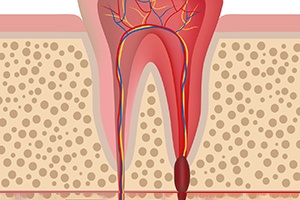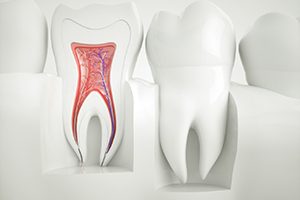
Root Canal Therapy – East Hartford, CT
Save Your Tooth and Relieve Your Pain

Root canal therapy has long been regarded as a scary, painful procedure — but, in fact, this treatment is designed to save your tooth and relieve your pain. We use the latest technology and techniques to carry out root canal therapy so our patients enjoy comfortable effective treatment. Call our East Hartford office today to learn more about how we may be able to preserve your natural smile with this restorative option.
Why Choose Comprehensive Dental Associates of Central Connecticut for Root Canal Therapy?
- Advanced Technology and Treatment Techniques
- Sedation and Anesthesia for Patient Comfort
- Save a Damaged Tooth from Extraction
Do I Need Root Canal Therapy?

Root canal therapy becomes necessary when the innermost layer of a tooth, called the pulp, becomes infected. You may have an infection if you are experiencing any of the following:
- A severe, throbbing toothache
- A tooth that is darker than the ones around it
- A small bump on the gums that resembles a pimple
- A tooth with visible signs of damage
- Severe dental sensitivity to temperature changes or pressure
In some cases, root canal therapy is necessary even if a patient is not in any pain. It is always wise to listen to treatment recommendations from your dentist.
The Root Canal Process

Here is an overview of how the root canal therapy procedure usually works:
- We use our cone beam scanner to get a detailed, three-dimensional view of the tooth and the surrounding structures. Then, we can plan exactly what needs to happen during treatment.
- We ensure you are comfortable with anesthesia and possibly sedation.
- We access the interior portion of the tooth and remove any damaged or infected tissues. We also remove the nerves inside the tooth that send pain signals to the brain.
- We fill the weakened tooth with a material called gutta-percha.
- We place a crown on top of the treated tooth to fully restore its structure and strength.
The Benefits of Getting a Root Canal

Some benefits that you may enjoy as a result of root canal therapy include:
- Preservation of your natural tooth. Often, root canal therapy can help patients avoid the need for an extraction.
- The end of a toothache. Because it involves removing a tooth’s nerve, this treatment can instantly end even a debilitating toothache.
- Long-lasting results. Root canal therapy is successful in the vast majority of cases, and its results can last a lifetime.
- Easy aftercare. Protecting your treated tooth is simple. Thorough oral hygiene and routine dental visits are both important.
- A beautiful smile. The crown placed on your treated tooth can be designed to look virtually identical to natural tooth enamel.
Understanding the Cost of Root Canals

The cost of root canals is not universal. During your consultation, we will be able to provide you with a personalized estimate. We will also familiarize you with options that might make your care more affordable, such as insurance claims and financing. You can be confident that this treatment is a smart use of funds that aims to provide long-term benefits to your oral health.
Factors That Can Affect Root Canal Cost

Some factors that can influence the cost of root canal therapy include:
- The specific tooth that requires treatment. The type and location of a tooth can affect how challenging it is to treat. For example, root canal therapy usually costs more for molars because they have two roots rather than just one.
- The overall complexity of the case. We can usually perform root canal therapy right here in our East Hartford office. In some cases, though, we have to refer patients to an outside specialist whose pricing structure is different from our own.
- Additional services. You will likely need a crown after your root canal, which will add to the total cost of your care.
Is It Cheaper to Pull My Tooth?

The upfront price of a tooth extraction is lower than that of root canal therapy. However, we encourage you to consider the long-term financial consequences of any treatment you choose. With an extraction, you should pay for a dental implant or another form of tooth replacement. Otherwise, you could end up suffering from issues like dental drift and future tooth loss. The total cost of your care could add up to be quite a bit.
Root canal therapy, on the other hand, is usually a one-and-done expense that can provide many years of improved dental function. It is an excellent value!
Does Dental Insurance Cover Root Canals?

In most cases, yes, dental insurance does cover root canal therapy. It may be designated as either a minor or major service (depending on the details of your policy), so anywhere from 40% to 80% of its cost might be covered, up to the amount of your annual maximum. Our practice accepts many forms of dental insurance, so we can help you navigate your benefits and use them to your greatest advantage.
Other Options for Making Root Canal Therapy Affordable

In addition to insurance, there are a few provisions that might make it easier for you to afford root canal therapy:
- The Essential Dental Plan. This discount plan is designed for patients without insurance. Signing up is easy, and the cost is reasonable. The plan provides reduced fees on virtually all the services available in our practice.
- Most patients are eligible for financing through CareCredit, a third-party lender. The application process is quick, and it is likely that you will be approved for a no-interest or low-interest payment plan.
Are you curious to learn more about root canal therapy and its cost? Our team is standing by to answer your questions. Get in touch with us today to schedule a consultation.
Root Canal FAQs

The team at Comprehensive Dental Associates of Central Connecticut is ready to support your oral health by performing root canal therapy. Before you book your appointment, however, you may want to know more about this treatment and what to expect from it. Take a look at the following list of FAQs to become better informed about root canal therapy. If you would like further explanation on anything you discover, reach out to us directly. We look forward to hearing from you.
How Long Does It Take to Recover from a Root Canal?
Most patients are able to return to work or school the day after their procedure. However, if your job requires a lot of physical labor, it would be wise to take a few extra days of rest. Strenuous exercise could slow down your body’s ability to heal.
Your mouth may be sore for several days. You can minimize discomfort by taking painkillers, getting plenty of rest, and eating a soft diet.
If you run into any concerns or experience any unusual symptoms during you recovery, contact our team immediately.
What Should I Do Before a Root Canal?
Here are some practical steps you can take before your appointment:
- Eat a nutritious meal. You may not feel like eating after your procedure, so filling up beforehand is a wise idea. The exception to this is if you will be sedated for your root canal; you may be asked to fast for several hours leading up to your appointment.
- Take a pain reliever. Taking some ibuprofen or another over-the-counter pain reliever before your appointment can mitigate the discomfort you will feel afterward.
- Get enough sleep. Being well-rested can reduce anxiety and prepare your body to heal well.
What Happens If You Wait Too Long for a Root Canal?
Teeth cannot heal themselves, so if you postpone your root canal for too long, your dental problem will worsen. It may even reach the point where root canal therapy can no longer preserve your tooth; you might need to get it extracted.
It is also possible that the infection in your tooth could spread into nearby tissues and cause widespread damage. In rare cases, patients have died from complications resulting from an untreated dental infection.
Can Root Canals Be Prevented?
In many cases, root canals are preventable. Here are some things you can do to reduce the need that you will require this treatment:
- Stick to a thorough oral hygiene routine. You should brush your teeth twice a day, floss once a day, and drink plenty of water.
- Maintain a balanced diet. It is wise to limit sugar and eat lots of nutrient-dense foods that support oral health.
- Protect your teeth from trauma. You should always wear a mouthguard when you play sports. If you grind your teeth at night, you should use a nightguard to reduce wear and tear on your enamel.